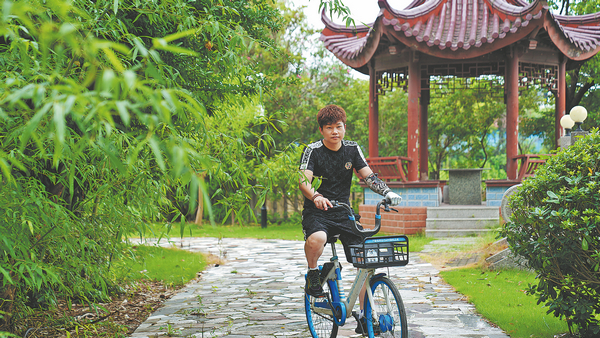

Completing people
Wu received nearly two hours of training after successfully connecting to the bionic hand and became proficient in using the device within a week. Today, he is able to perform basic tasks like typing, retrieving items using his new hand, and even riding a bike.
Six months after receiving his bionic hand, Wu found a food delivery job in Zhanjiang, Guangdong. A while later, he landed a job as a testing specialist at OYMotion Technologies.
"I have finally found some stability in life as I now have a monthly income. This has improved my family's living conditions to a great extent," Wu says. "A lot of people don't know about this technology, so part of the reason I'm doing it is to recommend this hand to more people in need.
"I once met a user in Fujian province. His wife said he hadn't spoken for nearly a month before I met him. He worried about getting a job, whether his wife would leave him, and how he would raise his children. After we introduced the bionic hand to him and helped him adapt, he became optimistic and found a job!"
Another person who has benefited from OHand is Pang Qilong, who was born in Fuyang, Anhui province, with congenital palm deformity. For most of his life, Pang felt as if his body was not "complete", but that changed when he learned about the bionic hand after coming to Shanghai to attend college a few years ago.
"What this bionic hand has given me is not just another limb. It has allowed me to fulfill my childhood dream and given me confidence in life. It is these intangible things that matter the most," says Pang, who currently does market research on the investment sector at an office in Lujiazui in Pudong New Area, the financial hub of Shanghai.
Giving others the opportunity to change their lives the way Wu and Pang have was one of the main reasons why Ni Hualiang, the founder of OYMotion Technologies, started his company.
"In addition to being able to solve daily issues, another purpose of the bionic hand is to meet the psychological needs of customers and make them more confident," Ni says.
But the bigger goal, he points out, is to help more people with physical challenges find proper employment. He notes that despite the preferential policies implemented by the central and provincial governments, it is still relatively difficult for these people to find jobs in today's highly competitive society.
Official statistics show that the total number of disabled people in China was about 85.02 million. Among them, 24.72 million had limb disabilities.
"I hope that through advanced technology, we are able to do more in life and work," he says.